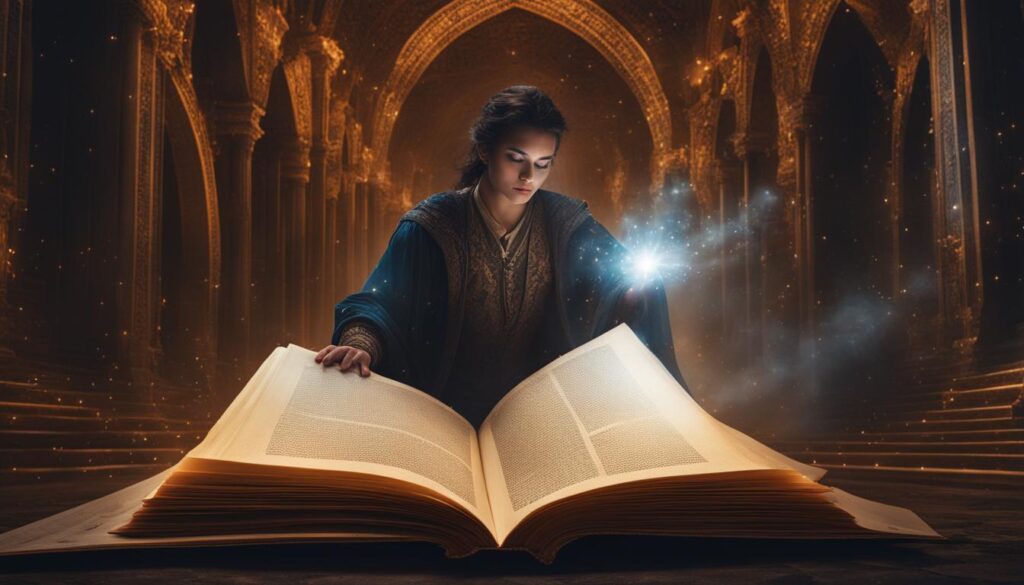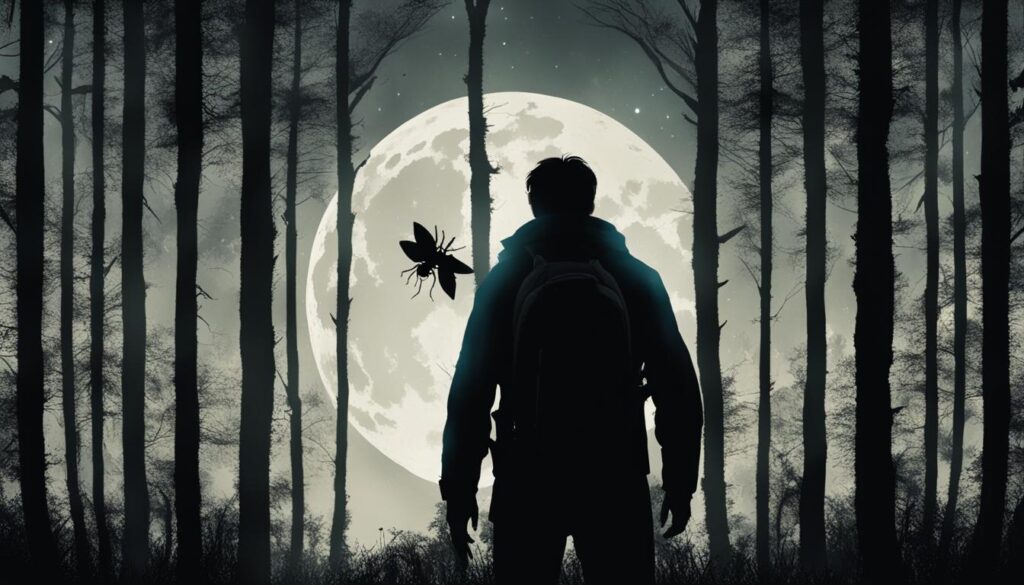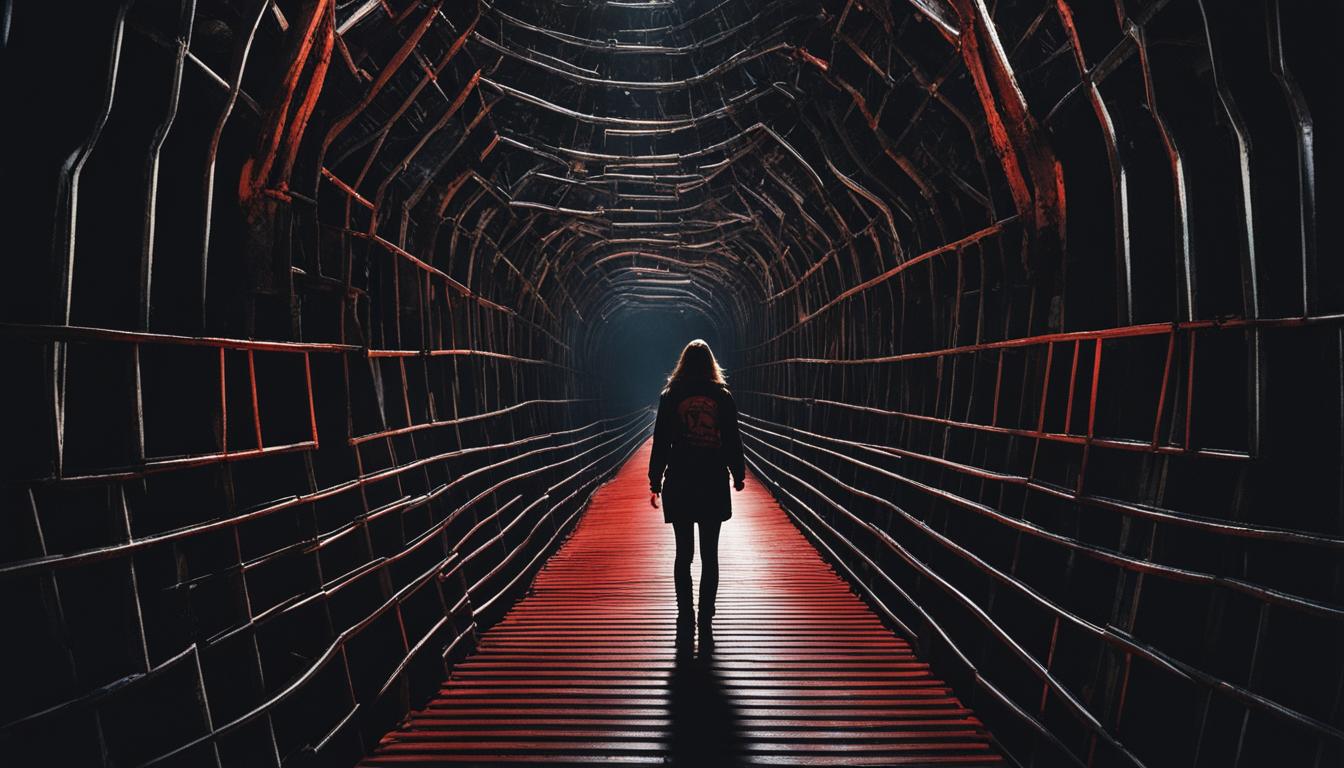Welcome to our exploration of the captivating world of horror movies. In this article, we will analyze the reasons behind our collective fascination with the genre, as explored by Stephen King in his essay “Why We Crave Horror Movies.” Horror movies have been a staple of cinema since the early 1900s, and their popularity shows no signs of waning. But what is it about these frightening tales that keeps us coming back for more?
From the allure of fear to the cathartic release they provide, horror movies offer a unique experience that is both thrilling and terrifying. By examining the psychological and emotional aspects that draw us towards horror films, we hope to shed light on this enigmatic genre.
The Allure of Fear
Horror movies have a distinct appeal that draws us in. The allure of fear itself is a fascinating concept, one that has been explored by scientists and psychologists alike. It’s not just the scares and thrills that we seek, but the adrenaline rush and heightened emotions that come with them.
Our primal instincts are at play here, as fear triggers our fight or flight response, causing a rush of hormones that leave us feeling energized and alive. Horror movies provide a safe space in which we can experience these powerful emotions, without any actual danger.
The allure of fear is not a new concept. Throughout history, humans have sought out and enjoyed experiences that induce fear, from ghost stories around the campfire to haunted house tours. Horror movies provide a modern outlet for this age-old desire.
Unleashing Our Dark Sides
The dark side of the human psyche intrigues us all, and horror movies provide a controlled environment to explore and unleash it. By immersing ourselves in these frightening narratives, we confront our suppressed fears and desires, allowing for a sense of cathartic release.
According to a study by Psychology Today, we find pleasure in horror movies because they take us out of our comfort zones and give us a new perspective on our own fears. The experience can be empowering, as facing our fears can make us feel stronger and braver in our everyday lives.
Furthermore, horror movies provide sort of a safe haven for taboo desires that may not be acceptable in real-life situations. Through experiencing fictional terror, we can test our moral and intellectual boundaries without any real-life ramifications.
Escaping Real-Life Anxiety
Life can be overwhelming, and stress and anxiety are often a constant presence. When the burden becomes too much, horror movies can provide a momentary escape from reality. The fictional settings, characters, and storylines can offer a sense of detachment that allows viewers to temporarily forget about their real-life worries.
Watching horror movies can be a cathartic release, providing an outlet for pent-up emotions and anxieties. While the events on screen may be terrifying, they do not pose a real threat, allowing viewers to confront and process their fears in a controlled environment. By facing these fears through horror movies, viewers may feel more empowered to confront their anxieties outside of the movie theater.
The feeling of being scared in a horror movie can be thrilling, but it may also be an opportunity to revisit and confront fears that are normally buried deep within us. Horror movies may challenge our beliefs about ourselves and the world, but through that confrontation, we may gain new insights and perspectives.
Curiosity and the Unknown
Horror movies have an undeniable appeal for the human mind. We are naturally curious beings, and the eerie, scary elements of horror cinema pique our interest in ways that other genres cannot. They offer us an opportunity to explore the unknown and push the boundaries of our knowledge and experience. As Stephen King notes in his essay, “Why we crave horror movies”: “We like to prove to ourselves that we can handle it and that we can do so with impunity.”
The fear of the unknown has always been a driving force in human nature, and horror movies tap into this instinct in a way that no other genre can. When we watch a horror movie, we are transported into a world of darkness and uncertainty. We find ourselves on the edge of our seats, waiting for the next scare, unsure of what is going to happen next. This uncertainty keeps us engaged and curious, drawing us deeper into the story.
The genre thrives on the mysterious and unsettling elements of the unknown. From supernatural monsters and psychological horrors to unexplained events and mysterious creatures, horror outshines the others in its ability to captivate our attention with its sense of the unknown.
As viewers, we are always attempting to uncover the mysteries and secrets behind the terrors of the movie screen.
The Power of Imagination
This sense of curiosity and exploration also stimulates our imagination and encourages creativity. By opening up our minds to the unknown, we explore new thoughts and perspectives, and give ourselves the opportunity to discover new ideas. As a result, horror cinema inspires new forms of artistic expression and encourages us to break free of conventional thought patterns and to think more deeply about the world around us.
Ultimately, the allure of the unknown in horror movies leads to a sense of discovery and agency. It allows us to explore new dimensions of ourselves, our human nature, and our relationship with the world. For that reason, it remains a timeless and deeply engaging genre that will continue to captivate audiences for generations to come.
Connecting with Our Vulnerabilities
Horror movies have a unique ability to connect with our deepest vulnerabilities and fears. These films often tap into our primal instincts and explore the darker aspects of our existence, forcing us to confront and examine our own mortality.
Through the portrayal of terrifying scenarios and characters, horror movies act as a mirror that reflects our own fears and uncertainties, allowing us to connect with them in a safe and controlled environment. This connection can be cathartic, as it provides a space for us to confront and process our deepest anxieties.
One of the most powerful aspects of horror movies is their ability to create empathy between the audience and the characters. When we witness these characters facing their own fears and vulnerabilities, we are able to connect with them on a deeper level and see ourselves within their struggles.
This connection to vulnerable and relatable characters is essential in horror movies, as it helps to create an emotional investment in the story and increase the overall impact of the scares and thrills.
The Power of Storytelling
Storytelling is a form of art that has been passed down through the ages and engrained in human culture. Horror movies, in particular, possess a unique power when it comes to storytelling. They not only entertain and thrill audiences, but also provide a platform for exploring societal issues and universal themes. The power of storytelling lies in its ability to tap into the human psyche and evoke genuine emotions and reactions.
Through crafting compelling and terrifying narratives, horror movies have the ability to engage and captivate audiences. By tapping into universal fears and emotions such as loss, isolation, and powerlessness, horror stories stimulate the imagination and provoke thought-provoking discussions.

These stories also offer a sense of catharsis and emotional release for viewers. By confronting and engaging with their fears in a controlled environment, audiences experience a sense of psychological relief that can be both energizing and empowering.
Examples of the Power of Storytelling in Horror Movies
| Movie Title | Storyline | Powerful Themes Addressed |
|---|---|---|
| The Babadook | A widowed mother and her son are terrorized by a monster from a children’s book. | Grief, depression, coping with trauma, and motherhood. |
| Get Out | A young African American man visits his white girlfriend’s family, only to uncover a disturbing conspiracy. | Racism, cultural appropriation, and identity. |
| The Silence of the Lambs | An FBI trainee seeks the help of a former psychiatrist turned cannibalistic murderer to catch another serial killer on the loose. | Gender identity, misogyny, and the nature of evil. |
These movies use horror as a lens to explore complex and relevant social issues, creating narratives that are both terrifying and thought-provoking.
Community and Shared Experience
Horror movies have always attracted audiences looking for a unique and thrilling experience. What’s even better is enjoying the scares with a community of fellow horror fans. Whether watching in a movie theater or engaging in online discussions, shared experiences with like-minded individuals foster a sense of community and belonging.
As social creatures, humans crave connection and shared experiences, and nothing strengthens bonds like the shared experience of fear. Horror movies provide a platform for shared reactions, emotions, and discussions. The communal experience can be so compelling that it often leads to traditions such as Halloween horror movie marathons or horror-themed parties.
Moreover, the shared experience of horror films can create a sense of empowerment. The fear experienced while watching a horror movie can be overwhelming, so finding comfort and support in a group can be empowering. Additionally, the shared experience can provide a sense of validation for experiencing fear, reducing feelings of isolation or abnormality.
Overall, the communal experience of watching horror movies emphasizes the power of connections and human emotions. Whether enjoying the movie with friends or engaging in online discussions, the shared experience of horror can bring people closer together.
Challenging Boundaries and Social Taboos
The horror genre has been a platform for filmmakers and writers to explore controversial themes, push the boundaries of societal norms, and challenge prevailing beliefs. From addressing mental illness to addressing social inequalities, horror films have tackled taboo subjects head-on, often to great critical acclaim.
More recently, horror movies have explored societal fears, including pandemics, technology, and climate change. By confronting these issues in a fictionalized environment, filmmakers and writers can foster a dialogue that can lead to deeper understanding and solutions.
Moreover, horror films have a unique ability to confront real societal issues in a way that is both thought-provoking and engaging. These films bring attention to social issues that are often overlooked and stigmatized, providing a platform for marginalized perspectives and promoting social justice.
Through challenging boundaries and pushing social taboos, horror films have remained relevant throughout the years, sparking discussions and provoking thought long after the credits roll.
Psychological Impact and Cathartic Relief
Horror movies can have a significant psychological impact on viewers. By immersing ourselves in the fear and tension, we experience a surge of adrenaline that triggers our fight or flight response. This can result in an increased heart rate, rapid breathing, and heightened senses.
Studies have found that these physical reactions can actually have a positive effect on our mental health. By facing our fears in a controlled environment, we can achieve a sense of cathartic relief. This release of emotions can provide a sense of empowerment and emotional regulation.

Additionally, horror movies can serve as a form of exposure therapy. By repeatedly exposing ourselves to fearful stimuli, we can desensitize ourselves to the anxiety they induce. This can translate to real-world fears and phobias, providing a tool for managing anxiety and improving overall coping mechanisms.
However, it’s important to note that not all viewers have the same response to horror movies. For some, the experience may be too overwhelming and result in negative psychological effects. As with any form of entertainment, it’s crucial to listen to our own emotional limits and engage with media that is suitable for our individual needs.
Conclusion
In conclusion, Stephen King’s essay “Why We Crave Horror Movies” has shed light on the many reasons behind our fascination with the genre. From the allure of fear, to the exploration of our dark sides, and the cathartic relief it provides, horror movies offer a unique experience for audiences.
Beyond entertainment, horror films also have the power to challenge societal boundaries, spark discussions on controversial topics, and connect people through shared experiences. The genre’s ability to tap into universal fears and emotions allows for compelling storytelling that engages and captivates audiences.
While horror movies may not be for everyone, they provide a valuable outlet for those seeking an escape from everyday anxieties and a chance to confront their fears in a controlled environment. As Stephen King eloquently put it, “we make up horrors to help us cope with the real ones.”



